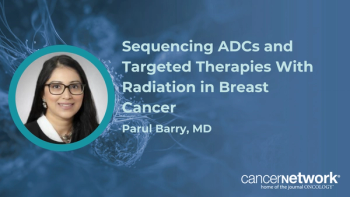
- ONCOLOGY Vol 12 No 6
- Volume 12
- Issue 6
Common Mutations Linked to Increased Breast Cancer Risk
Women with common variations in the class of enzyme known as glutathione S-transferase (GST), which detoxify carcinogens, are at increased risk of developing breast cancer, according to researchers at the Johns Hopkins School of Public Health.
Women with common variations in the class of enzyme known as glutathione S-transferase (GST), which detoxify carcinogens, are at increased risk of developing breast cancer, according to researchers at the Johns Hopkins School of Public Health.
The Johns Hopkins scientists found that certain genetic variants of three GST genes increased a womans odds of developing breast cancer by 1.5 to 2.5 times. Proteins produced by GST genes help the body disarm chemically reactive molecules that can damage cells DNA and start them on the road to becoming cancerous. The highest change, a nearly fourfold increase in risk, occurred in women with mutations in all three genes.
Significant Increase in Risk
"This appears to be a significant increase in risk," said Kathy Helzlsouer, MD, associate professor of epidem-iology. "Its definitely not as large as the risk increase associated with genes like BRCA1 or BRCA2, but this genetic variant affects a much larger group of women. One of these genetic variants, for example, is estimated to occur in about 44% of the population."
For the study, published in the Journal of the National Cancer Institute, scientists at Johns Hopkins compared the genetic make-up of 110 breast cancer patients with 113 women not affected by breast cancer. They found that the women who had breast cancer were more likely to have variations in the GST gene family.
According to Dr. Helzlsouer, if the association can be confirmed by larger studies, a substantial proportion of breast cancer cases may be prevented. Women could be tested for the genetic variations and then advised about avoiding certain environmental cancer risk factors that may trigger their cancer.
The patients and control subjects were closely matched for age, menopausal status, and age of first period and first pregnancy. A slightly larger number of the control subjects used estrogen replacement therapy, and each group had similar rates of contraceptive use.
"We had a pretty tight fit between the control and the experimental group," said Dr. Helzlsouer, "but we cant be sure another risk factor isnt affecting our results until researchers can study these connections in a much larger group of patients."
Articles in this issue
over 27 years ago
Radiofrequency Waves Used to Kill Inoperable Liver Tumorsover 27 years ago
ONS Receives Educational Grants to Fund Conferencesover 27 years ago
Salvage Therapy for Ovarian Cancerover 27 years ago
Women’s Dissatisfaction With Body Image Can Affect Smokingover 27 years ago
M. D. Anderson Initiates Aggressive Ovarian Cancer Screening Programover 27 years ago
Gene May Provide Specific Target For Attacking Prostate Cancerover 27 years ago
Medicare Now Reimburses Cancer Patients for Granisetron TabletsNewsletter
Stay up to date on recent advances in the multidisciplinary approach to cancer.





































